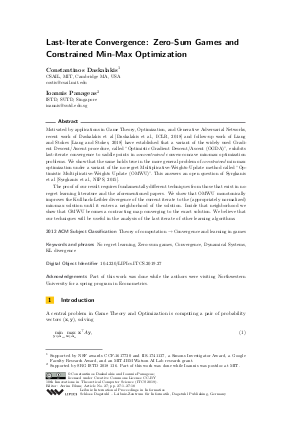Last-Iterate Convergence: Zero-Sum Games and Constrained Min-Max Optimization
Authors Constantinos Daskalakis, Ioannis Panageas
-
Part of:
Volume:
10th Innovations in Theoretical Computer Science Conference (ITCS 2019)
Part of: Series: Leibniz International Proceedings in Informatics (LIPIcs)
Part of: Conference: Innovations in Theoretical Computer Science Conference (ITCS) - License:
 Creative Commons Attribution 3.0 Unported license
Creative Commons Attribution 3.0 Unported license
- Publication Date: 2019-01-08
File

PDF
LIPIcs.ITCS.2019.27.pdf
- Filesize: 0.61 MB
- 18 pages
Document Identifiers
Subject Classification
ACM Subject Classification
- Theory of computation → Convergence and learning in games
Keywords
- No regret learning
- Zero-sum games
- Convergence
- Dynamical Systems
- KL divergence
Metrics
- Access Statistics
-
Total Accesses (updated on a weekly basis)
0Document
0Metadata
Abstract
Motivated by applications in Game Theory, Optimization, and Generative Adversarial Networks, recent work of Daskalakis et al [Daskalakis et al., ICLR, 2018] and follow-up work of Liang and Stokes [Liang and Stokes, 2018] have established that a variant of the widely used Gradient Descent/Ascent procedure, called "Optimistic Gradient Descent/Ascent (OGDA)", exhibits last-iterate convergence to saddle points in unconstrained convex-concave min-max optimization problems. We show that the same holds true in the more general problem of constrained min-max optimization under a variant of the no-regret Multiplicative-Weights-Update method called "Optimistic Multiplicative-Weights Update (OMWU)". This answers an open question of Syrgkanis et al [Syrgkanis et al., NIPS, 2015]. The proof of our result requires fundamentally different techniques from those that exist in no-regret learning literature and the aforementioned papers. We show that OMWU monotonically improves the Kullback-Leibler divergence of the current iterate to the (appropriately normalized) min-max solution until it enters a neighborhood of the solution. Inside that neighborhood we show that OMWU becomes a contracting map converging to the exact solution. We believe that our techniques will be useful in the analysis of the last iterate of other learning algorithms.
Cite As Get BibTex
Constantinos Daskalakis and Ioannis Panageas. Last-Iterate Convergence: Zero-Sum Games and Constrained Min-Max Optimization. In 10th Innovations in Theoretical Computer Science Conference (ITCS 2019). Leibniz International Proceedings in Informatics (LIPIcs), Volume 124, pp. 27:1-27:18, Schloss Dagstuhl – Leibniz-Zentrum für Informatik (2019)
https://doi.org/10.4230/LIPIcs.ITCS.2019.27
BibTex
@InProceedings{daskalakis_et_al:LIPIcs.ITCS.2019.27,
author = {Daskalakis, Constantinos and Panageas, Ioannis},
title = {{Last-Iterate Convergence: Zero-Sum Games and Constrained Min-Max Optimization}},
booktitle = {10th Innovations in Theoretical Computer Science Conference (ITCS 2019)},
pages = {27:1--27:18},
series = {Leibniz International Proceedings in Informatics (LIPIcs)},
ISBN = {978-3-95977-095-8},
ISSN = {1868-8969},
year = {2019},
volume = {124},
editor = {Blum, Avrim},
publisher = {Schloss Dagstuhl -- Leibniz-Zentrum f{\"u}r Informatik},
address = {Dagstuhl, Germany},
URL = {https://drops.dagstuhl.de/entities/document/10.4230/LIPIcs.ITCS.2019.27},
URN = {urn:nbn:de:0030-drops-101204},
doi = {10.4230/LIPIcs.ITCS.2019.27},
annote = {Keywords: No regret learning, Zero-sum games, Convergence, Dynamical Systems, KL divergence}
}
Author Details
Funding
- Daskalakis, Constantinos: Supported by NSF awards CCF-1617730 and IIS-1741137, a Simons Investigator Award, a Google Faculty Research Award, and an MIT-IBM Watson AI Lab research grant.
- Panageas, Ioannis: Supported by SRG ISTD 2018 136. Part of this work was done while Ioannis was postdoc at MIT.
References
-
Ilan Adler. The equivalence of linear programs and zero-sum games. In International Journal of Game Theory, pages 165-177, 2013.

-
James P. Bailey and Georgios Piliouras. Multiplicative Weights Update in Zero-Sum Games. In Proceedings of the 2018 ACM Conference on Economics and Computation, Ithaca, NY, USA, June 18-22, 2018, pages 321-338, 2018.

-
David Blackwell. An analog of the minimax theorem for vector payoffs. In Pacific J. Math., pages 1-8, 1956.

-
G.W Brown. Iterative Solutions of Games by Fictitious Play. In Activity Analysis of Production and Allocation, 1951.

-
Nikolo Cesa-Bianchi and Gabor Lugosi. Prediction, Learning, and Games. Cambridge University Press, 2006.

-
Eric Van Damme. Stability and perfection of Nash equilibria. Springer, 1991.

-
George B Dantzig. A proof of the equivalence of the programming problem and the game problem. Activity analysis of production and allocation, pages 330-338, 1951.

- Constantinos Daskalakis, Andrew Ilyas, Vasilis Syrgkanis, and Haoyang Zeng. Training GANs with Optimism. In Proceedings of ICLR, 2018. URL: http://arxiv.org/abs/1711.00141.
-
Oded Galor. Discrete Dynamical Systems. Springer, 2007.

-
Ian Goodfellow, Jean Pouget-Abadie, Mehdi Mirza, Bing Xu, David Warde-Farley, Sherjil Ozair, Aaron Courville, and Yoshua Bengio. Generative adversarial nets. In Advances in neural information processing systems, pages 2672-2680, 2014.

-
Tengyuan Liang and James Stokes. Interaction Matters: A Note on Non-asymptotic Local Convergence of Generative Adversarial Networks. arXiv preprint:1802.06132, 2018.

-
Ruta Mehta, Ioannis Panageas, Georgios Piliouras, Prasad Tetali, and Vijay V. Vazirani. Mutation, Sexual Reproduction and Survival in Dynamic Environments. In 8th Innovations in Theoretical Computer Science Conference, ITCS 2017, January 9-11, 2017, Berkeley, CA, USA, pages 16:1-16:29, 2017.

-
Panayotis Mertikopoulos, Christos Papadimitriou, and Georgios Piliouras. Cycles in Adversarial Regularized Learning. In Proceedings of the Twenty-Ninth Annual ACM-SIAM Symposium on Discrete Algorithms, SODA 2018, New Orleans, LA, USA, January 7-10, 2018, pages 2703-2717, 2018.

-
Panayotis Mertikopoulos, Houssam Zenati, Bruno Lecouat, Chuan-Sheng Foo, Vijay Chandrasekhar, and Georgios Piliouras. Mirror descent in saddle-point problems: Going the extra (gradient) mile. CoRR, abs/1807.02629, 2018.

-
Yurii Nesterov. Smooth minimization of non-smooth functions. Math. Program., 103(1):127-152, 2005.

-
Gerasimos Palaiopanos, Ioannis Panageas, and Georgios Piliouras. Multiplicative Weights Update with Constant Step-Size in Congestion Games: Convergence, Limit Cycles and Chaos. In Advances in Neural Information Processing Systems 30: Annual Conference on Neural Information Processing Systems 2017, 4-9 December 2017, Long Beach, CA, USA, pages 5874-5884, 2017.

-
Alexander Rakhlin and Karthik Sridharan. Online Learning with Predictable Sequences. In COLT 2013 - The 26th Annual Conference on Learning Theory, June 12-14, 2013, Princeton University, NJ, USA, pages 993-1019, 2013.

-
J. Robinson. An Iterative Method of Solving a Game. In Annals of Mathematics, pages 296-301, 1951.

-
Vasilis Syrgkanis, Alekh Agarwal, Haipeng Luo, and Robert E. Schapire. Fast Convergence of Regularized Learning in Games. In Annual Conference on Neural Information Processing Systems 2015, pages 2989-2997, 2015.

